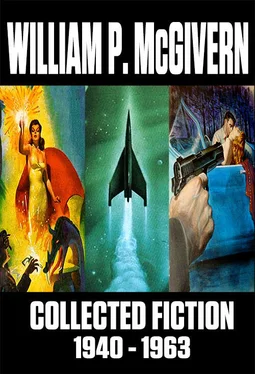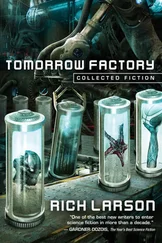Уильям Макгиверн - Collected Fiction - 1940-1963
Здесь есть возможность читать онлайн «Уильям Макгиверн - Collected Fiction - 1940-1963» весь текст электронной книги совершенно бесплатно (целиком полную версию без сокращений). В некоторых случаях можно слушать аудио, скачать через торрент в формате fb2 и присутствует краткое содержание. Год выпуска: 2014, Издательство: Jerry eBooks, Жанр: Ужасы и Мистика, Фантастика и фэнтези, Детектив, Прочие приключения, на английском языке. Описание произведения, (предисловие) а так же отзывы посетителей доступны на портале библиотеки ЛибКат.
- Название:Collected Fiction: 1940-1963
- Автор:
- Издательство:Jerry eBooks
- Жанр:
- Год:2014
- ISBN:нет данных
- Рейтинг книги:3 / 5. Голосов: 1
-
Избранное:Добавить в избранное
- Отзывы:
-
Ваша оценка:
- 60
- 1
- 2
- 3
- 4
- 5
Collected Fiction: 1940-1963: краткое содержание, описание и аннотация
Предлагаем к чтению аннотацию, описание, краткое содержание или предисловие (зависит от того, что написал сам автор книги «Collected Fiction: 1940-1963»). Если вы не нашли необходимую информацию о книге — напишите в комментариях, мы постараемся отыскать её.
Collected Fiction: 1940-1963 — читать онлайн бесплатно полную книгу (весь текст) целиком
Ниже представлен текст книги, разбитый по страницам. Система сохранения места последней прочитанной страницы, позволяет с удобством читать онлайн бесплатно книгу «Collected Fiction: 1940-1963», без необходимости каждый раз заново искать на чём Вы остановились. Поставьте закладку, и сможете в любой момент перейти на страницу, на которой закончили чтение.
Интервал:
Закладка:
The Ford bucked spasmodically as Bogan shifted gears, and in that momentary halt O’Leary flung the upper part of his body into the back seat of the car. He wrapped his arms around Sheila’s knees and let his weight go limp; and when the car surged forward again, his legs dragged along the ground, and then he was free, slamming painfully against the wet concrete with Sheila’s light weight held desperately in his arms.
O’Leary came to his knees and held her tightly against him for an instant, isolating her from the roar of cars, the flash of gunfire. She was crying hysterically, saying his name over and over, but there was no recognition in her eyes or face. The terror would not leave her for a long time, but she was clinging to someone who would be with her until it did.
O’Leary left her with detectives who had poured from the convoy sedans and ran back to his own patrol car. The Ford had crashed past the loll booth and was racing down the half-mile stretch of highway that led to the bay bridge. But there was no escape now; three blue-and-white patrol cars were speeding after it, maneuvering for position with merciless precision. There were no other cars on the road; Bogan roared down a deserted tunnel, with patrol cars closing in behind him.
O’Leary shot past the toll booth after the pursuing police cars, holding his microphone to his lips. “He’s all alone,” he said. “The girl’s out of the car, she’s safe.” His report sounded in the patrols ahead of him and at headquarters in Riverhead.
Captain Royce said, “Don’t get careless now; don’t take any chances. He’s not going anywhere.” And he issued an order to the bridge police to open their span.
The bridge barriers slid automatically into place, and the powerful cables at the four corners of the bridge began to turn on their drums, lifting the span slowly into the air. “Take him when he stops,” Royce said.
XXI
Bogan saw water sparkling ahead of him, spreading away like a broad, calm meadow at dusk, with a soft wind stirring the leaves of grass so that they flashed with the last glancing rays of evening light. It was very lovely; quiet and peaceful. But he couldn’t stop crying. The tears streamed from his mild eyes and ran coldly down his cheeks. He needed someone to comfort him; someone he wasn’t afraid of.
The patrol cars were racing up behind him, he saw; stalking him like great, dangerous animals.
Brilliant red lights flashed in his eyes, and he saw a barrier, and beyond that a heavy chain swinging across the highway. And beyond that nothing but the wide, peaceful meadow that looked like water in the curious confusion of nighttime lights and shadows. He heard the crash of his car against the barrier and then the wrenching, snapping sound of the chain giving, and then he was free at last, soaring toward the dark, mild meadow, as effortlessly as a bird, or a child’s paper airplane.
Dan O’Leary swung his car about and snapped off his siren and beacon lights.
He sat for half a moment with his arms crossed on the steering wheel, his forehead resting on the backs of his hands. It was all over; the Ford had plunged into Washington Bay, and after the noise of the crash and a plume of white spray, there was nothing left but the spreading ripples on the surface of the black, silent water.
O’Leary said a prayer that Sheila was safe. Then he started back to Interchange 1, where she was waiting for him.
He drove at less than the legal maximum speed, steadily and precisely, his big hands firm on the wheel, his eyes alert on the road ahead of him. There was no need to hurry this last half mile to Interchange 1, he thought gratefully; the important part of him was already there.
Notes
1
While it would hardly seem possible that vanishing cream could make anyone disappear, it is conceivable that Oscar’s special secret formula, which he mixed with the ordinary vanishing cream, contained an infiltrating property which was absorbed through his skin. It reacted by neutralizing skin, hair, eye and lip pigmentation and coloring, in a cycle of set periods. Therefore at definite intervals, Oscar became “invisible” — because changes within his system, influenced by the special formula, made him colorless, while at the same time impairing none of his faculties.
2
It is a well-known fact that water expands when it freezes, and many an expensive plumber’s bill has been submitted to careless persons who forget their science to the extent of allowing their water pipes to freeze. The force of a few cubic inches of water is sufficient to burst a strong steel pipe. Automobile motor blocks are shattered like glass by a few quarts of water. Therefore, it presents an interesting problem as to the amount of pressure that would be produced by a quantity of water such as this, filling a whole section of the Chicago Subway. Pressure on an ordinary automobile motor block, to burst it, requires several thousand pounds per square inch. It is quite logical to estimate that literally billions of pounds of pressure would be exerted by a large quantity of water such as this.
3
Astrology is not regarded generally as a true science, but as a pseudo science. Many people believe the stars do have an influence on events, and science itself does not deny that this may be the case. Certainly powerful radiations are emanated by all super-heated bodies, such as the stars are, and conceivably, they may effect our bodies and minds, and in that manner, events. However, cold bodies, like the planets, on which astrology is largely based, cannot affect us that way, and the powers attributed to them are largely mythical, and not to be confused with the science of astronomy.
4
A tesseract is constructed by assuming a point (on paper for a visual concept if you wish) and moving it a short distance so as to form a line. Then the whole line is moved in a plane at right angles to form a square. The square surface thus achieved (which is where you’ll have to leave your paper) is in turn moved at right angles through the third dimension. Now, theoretically, the next movement of your resulting figure, which is a cube, is at right angles to all lines of the cube (the fourth dimension) so as to form the figure in question, a tesseract. This figure, purely imaginary, is used to demonstrate that unknown place called the “fourth dimension.”
5
Tommy cannons: A slang term for Atomic cannon.
6
Searching far back into the dim reaches of superstition and time we are unable to determine just why futility and frustration are usually manifested in concrete form by thick mist, or fog, and constant rain. It is possible that it is a result of the early days of man, when the Earth was a steaming jungle, and rain was the rule, and fog was ever present, especially in the dank depths of the forest. Or we might even go further back in evolution than that, and decide that the lizards from which we sprang, never saw the sun.
Be that as it may, men today are depressed by fog and mist and rain, and the forced inactivity it brings to children causes a depression that isn’t entirely due to resentment at not being able to go out and play, but to a fear of the unknown that is retained from the dawn of history when fog meant danger roving abroad, and meant staying in the cave for safety.
7
Science has many instances on record of human beings, who, when placed in a savage environment, developed the faculties of the beast to a high degree. The ability to stalk a quarry, to move noiselessly, and to remain hidden from the eyes of an intended victim, is thought by some scientists to be an ingrained heredity, handed down to man by his ancestral past, when he was in the process of evolving from the actual beast, to the true man. But other scientists deny this, and insist that-it is environment alone that makes a man develop animalistic abilities. In this story we have an interesting commentary on this scientific conception. Here, the author’s characters, placed by a terrible, civilization-wrecking war in a very primitive environment, forced to use mind, muscle, and stealthy cunning to procure food and to satisfy the most powerful of all urges, hunger, have slipped back in a few years to an animalistic plane that is actually not any different from that of the dawn man himself. Kogar and Merena are the products of our own civilization — yet, after the greatest of all wars, they become savages on a swift swoop back through time. Are we really as civilized as we think we are? And are we really as savage as we ever were in the past? Are men like Hitler really throwbacks?
Читать дальшеИнтервал:
Закладка:
Похожие книги на «Collected Fiction: 1940-1963»
Представляем Вашему вниманию похожие книги на «Collected Fiction: 1940-1963» списком для выбора. Мы отобрали схожую по названию и смыслу литературу в надежде предоставить читателям больше вариантов отыскать новые, интересные, ещё непрочитанные произведения.
Обсуждение, отзывы о книге «Collected Fiction: 1940-1963» и просто собственные мнения читателей. Оставьте ваши комментарии, напишите, что Вы думаете о произведении, его смысле или главных героях. Укажите что конкретно понравилось, а что нет, и почему Вы так считаете.

![Уильям Макгиверн - Завтра опять неизвестность [английский и русский параллельные тексты]](/books/35168/uilyam-makgivern-zavtra-opyat-neizvestnost-angli-thumb.webp)









